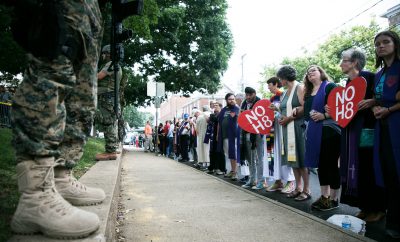 Image courtesy of [Chad Cooper via Flickr]
Image courtesy of [Chad Cooper via Flickr]
Entertainment
John Oliver Takes on Televangelists and the IRS
On the most recent episode of John Oliver’s comedy and talk show “Last Week Tonight,” the British funnyman highlighted the insane amounts of money that televangelists bring in. However one of his particular sticking points was the fact that televangelists are tax exempt.
In true John Oliver fashion, he made the point with plenty of sarcasm and hilarity, and actually started his own church “Our Lady of Perpetual Exemption” to prove his point. But Oliver’s expose isn’t just making people laugh–it’s spurring many toward action. In light of Oliver’s segment, many are calling for the IRS to crack down on televangelists.
Oliver particularly focused on television preachers who espouse an ideology called “seed faith.” Essentially “seed faith” means people are encouraged to donate money to the churches, and if they do so, good things will happen to them. This money grab tends to be massively successful for these preachers, especially because all of that “seed faith” money is tax exempt.
As Oliver points out in the segment, pretty much anything can register itself as a “church.” The president of the Trinity Foundation, an organization that investigates religious fraud, stated that: “A few years ago, the IRS named Scientology a church. Since that happened, anybody can call themselves a church.”
There are certain parameters that churches must adhere to in order to qualify for tax exemption, such as having ordained ministers, holding regular services, and having a doctrine. Some of these things are easy enough to obtain, and the toughest part–having a “sincerely-held doctrine”–isn’t subject to scrutiny by the IRS. That’s why organizations like the Church of Scientology, or various endeavors formed by televangelists, are allowed to be defined as churches.
The IRS can technically audit these churches, or more aptly “churches,” but usually doesn’t elect to. According to CBS News, the IRS only conducted three church audits last year, and none between 2009-2013, as it discontinued the practice for that period of time. As Oliver reads on the show from IRS documents:
IRS makes no attempt to evaluate the content of whatever doctrine a particular organization claims is religious, provided the particular beliefs…are truly and sincerely held…and the practices…are not illegal.
The IRS hasn’t responded to Oliver’s claims, even though the video has now gone viral and garnered about four million views.
There’s certainly a huge value to making sure that churches are tax exempt, as it ensures that freedom of religion will be protected, and the policy recognizes that churches undertake many charitable endeavors. But Oliver makes very valid points about the ways in which televangelists operate. As the video continues to be passed around at lightning speed, maybe the IRS will make some changes to its policies.








Comments